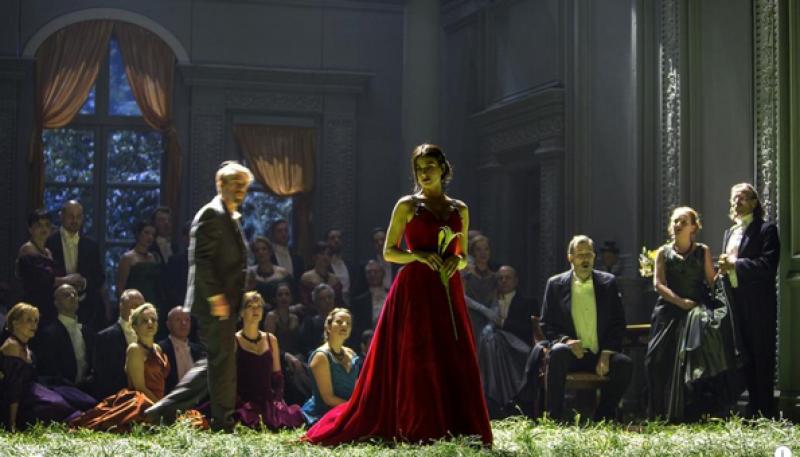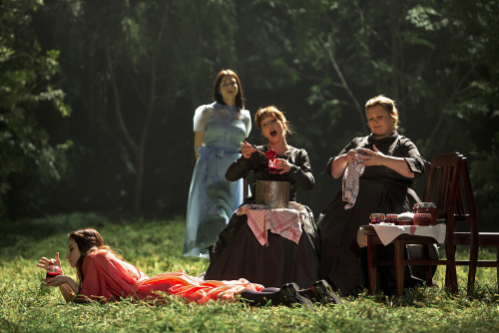Eugene Onegin, Komische Oper, OperaVision review - sensual and devastating | reviews, news & interviews
Eugene Onegin, Komische Oper, OperaVision review - sensual and devastating
Eugene Onegin, Komische Oper, OperaVision review - sensual and devastating
Kosky serves up first love hot and sweet and heartbreaking

Liberated from Pushkin’s salons, ballrooms and bedrooms, Barrie Kosky’s Eugene Onegin bursts out into nature. Tatyana and Olga lounge in the long grass stealing heavy fingerfuls of jam straight from the jar; party-guests run through the trees with flaming torches, dancing wildly, barefoot; after the harvest groups gather on the lawn with picnics and games. This is a world apart, the hot, hazy, endless summer of first love – an intense, but unreliable memory.
First seen at Berlin’s Komische Oper in 2016, and later at the Edinburgh Festival, this turn-of-the-century Onegin with its echoes of DH Lawrence and Hartley, is Tatyana’s story. There’s a sense of unreality to this gilded world of Rebecca Ringst’s sets, tellingly lit by Franck Evin, and by the time we arrive at the Letter Scene we realise why.
As the spotlight closes round Tatyana, turf still under foot, we realise that we’re seeing a remembered snapshot of a moment – the imprint of emotions tangled up with place. That teenage encounter, the sudden boldness, the transgressive freedom, is forever rooted in the Larin garden. Act III briefly banishes the memory, covering the ground with formal rugs, enclosing the space. But even here grass spills over the edges, and it takes only a momentary encounter between Tatyana and Onegin for civilisation to fall away and return us once again to the garden and to that summer.
 The strength of Kosky’s production is its emotional and atmospheric clarity. Tatyana’s humiliation during Triquet’s birthday serenade and her calm assurance during Gremin’s aria; the sensuality of the opening jam-making scene with its metaphorically loaded jars, setting us up for the unexpected erotic charge of the final encounter between Tatyana and Onegin.
The strength of Kosky’s production is its emotional and atmospheric clarity. Tatyana’s humiliation during Triquet’s birthday serenade and her calm assurance during Gremin’s aria; the sensuality of the opening jam-making scene with its metaphorically loaded jars, setting us up for the unexpected erotic charge of the final encounter between Tatyana and Onegin.
The arc is beautifully shaped by Asmik Grigorian (pictured above with Karolina Gumos, Christiane Oertel and Margarita Nekrasova). Rarely absent from the stage, the Lithuanian soprano (Female Singer of the Year at the 2019 International Opera Awards) finds Tatyana’s vulnerable, passionate awkwardness but also her dignity. The physical detail of the performance – hands twisting restlessly behind her back even while she’s rooted to the spot, an empty smile quickly smoothing over Onegin’s rudeness, even as her own hopes are shattered – offers a wonderful counterpoint to the dream-like, soft-focus atmosphere of all around.  Kosky’s updated setting strips away any risk of kitsch. There are no smiling gaggles of peasants (no peasants at all, in fact), the flattened-out hierarchy exposing Onegin’s snobbery in even greater relief. Young and raffishly handsome, Gunter Papendell (pictured above with Grigorian) breezes in with easy charm, unaware of the damage he is doing, but enjoying his power. His taut baritone is a good match for Aleš Briscein’s small, vibrant tenor, swelling into greater weight in his Act II aria. Both, however, are foils to Grigorian’s molasses-dark soprano, round, even and glowing right to the top of the voice – richest in duet with Karolina Gumos’s generous-toned Olga.
Kosky’s updated setting strips away any risk of kitsch. There are no smiling gaggles of peasants (no peasants at all, in fact), the flattened-out hierarchy exposing Onegin’s snobbery in even greater relief. Young and raffishly handsome, Gunter Papendell (pictured above with Grigorian) breezes in with easy charm, unaware of the damage he is doing, but enjoying his power. His taut baritone is a good match for Aleš Briscein’s small, vibrant tenor, swelling into greater weight in his Act II aria. Both, however, are foils to Grigorian’s molasses-dark soprano, round, even and glowing right to the top of the voice – richest in duet with Karolina Gumos’s generous-toned Olga.
This isn’t a perfect performance musically. Chorus and pit part ways a few times under conductor Henrik Nánási, and the cellos have one rather unfortunate moment, but the thrust of the thing is undeniable. It’s Kosky who drives this, attentive to every emotional current through the score, but it’s Grigorian – a Tatyana of dreams – who carries it home.
Watch the Komische Oper's Eugene Onegin on OperaVision (here via YouTube)
rating
Explore topics
Share this article
The future of Arts Journalism
You can stop theartsdesk.com closing!
We urgently need financing to survive. Our fundraising drive has thus far raised £49,000 but we need to reach £100,000 or we will be forced to close. Please contribute here: https://gofund.me/c3f6033d
And if you can forward this information to anyone who might assist, we’d be grateful.

Subscribe to theartsdesk.com
Thank you for continuing to read our work on theartsdesk.com. For unlimited access to every article in its entirety, including our archive of more than 15,000 pieces, we're asking for £5 per month or £40 per year. We feel it's a very good deal, and hope you do too.
To take a subscription now simply click here.
And if you're looking for that extra gift for a friend or family member, why not treat them to a theartsdesk.com gift subscription?
more Opera
 BBC Proms: The Marriage of Figaro, Glyndebourne Festival review - merriment and menace
Strong Proms transfer for a robust and affecting show
BBC Proms: The Marriage of Figaro, Glyndebourne Festival review - merriment and menace
Strong Proms transfer for a robust and affecting show
 Orpheus and Eurydice, Opera Queensland/SCO, Edinburgh International Festival 2025 review - dazzling, but distracting
Eye-popping acrobatics don’t always assist in Gluck’s quest for operatic truth
Orpheus and Eurydice, Opera Queensland/SCO, Edinburgh International Festival 2025 review - dazzling, but distracting
Eye-popping acrobatics don’t always assist in Gluck’s quest for operatic truth
 MARS, Irish National Opera review - silly space oddity with fun stretches
Cast, orchestra and production give Jennifer Walshe’s bold collage their all
MARS, Irish National Opera review - silly space oddity with fun stretches
Cast, orchestra and production give Jennifer Walshe’s bold collage their all
 Káťa Kabanová, Glyndebourne review - emotional concentration in a salle modulable
Janáček superbly done through or in spite of the symbolism
Káťa Kabanová, Glyndebourne review - emotional concentration in a salle modulable
Janáček superbly done through or in spite of the symbolism
 Buxton International Festival 2025 review - a lavish offering of smaller-scale work
Allison Cook stands out in a fascinating integrated double bill of Bernstein and Poulenc
Buxton International Festival 2025 review - a lavish offering of smaller-scale work
Allison Cook stands out in a fascinating integrated double bill of Bernstein and Poulenc
 Tosca, Clonter Opera review - beauty and integrity in miniature
Happy surprises and a convincing interpretation of Puccini for today
Tosca, Clonter Opera review - beauty and integrity in miniature
Happy surprises and a convincing interpretation of Puccini for today
 Hamlet, Buxton International Festival review - how to re-imagine re-imagined Shakespeare
Music comes first in very 19th century, very Romantic, very French operatic creation
Hamlet, Buxton International Festival review - how to re-imagine re-imagined Shakespeare
Music comes first in very 19th century, very Romantic, very French operatic creation
 Falstaff, Glyndebourne review - knockabout and nostalgia in postwar Windsor
A fat knight to remember, and snappy stagecraft, overcome some tedious waits
Falstaff, Glyndebourne review - knockabout and nostalgia in postwar Windsor
A fat knight to remember, and snappy stagecraft, overcome some tedious waits
 Salome, LSO, Pappano, Barbican review - a partnership in a million
Asmik Grigorian is vocal perfection in league with a great conductor and orchestra
Salome, LSO, Pappano, Barbican review - a partnership in a million
Asmik Grigorian is vocal perfection in league with a great conductor and orchestra
 Semele, Royal Opera review - unholy smoke
Style comes and goes in a justifiably dark treatment of Handelian myth
Semele, Royal Opera review - unholy smoke
Style comes and goes in a justifiably dark treatment of Handelian myth
 Le nozze di Figaro, Glyndebourne review - perceptive humanity in period setting
Mostly glorious cast, sharp ideas, fussy conducting
Le nozze di Figaro, Glyndebourne review - perceptive humanity in period setting
Mostly glorious cast, sharp ideas, fussy conducting
 Fidelio, Garsington Opera review - a battle of sunshine and shadows
Intimacy yields to spectacle as Beethoven's light of freedom triumphs
Fidelio, Garsington Opera review - a battle of sunshine and shadows
Intimacy yields to spectacle as Beethoven's light of freedom triumphs

Add comment